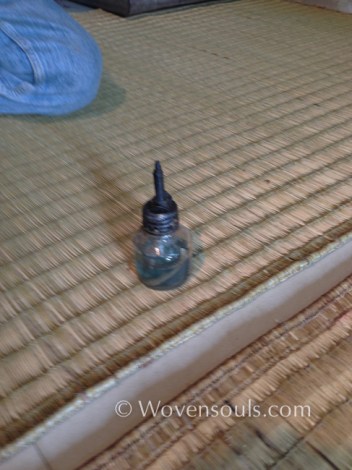Traditionally paper, textiles and stone have been used to create artworks. So when a new base material is encountered the most intriguing aspect for me is ‘how did this come about’.
Warli tribal paintings are done on a cow-dung base on textile. Would I, in a 100 years of creative thinking ever come up with that?
If I were one of the people living in a coastal area surrounded by swaying palm trees whispering constantly in the wind, would I ever thinking of picking up the one fallen frond and using it as a drawing board?
The answer in all likelihood is No. But here in Orissa, palm leaf paintings are commonplace. Everyone is familiar with the idea and it does not provide any novelty to them as it does to me. Me? I am wowed by the idea and have been for the past 2 decades since I first saw these at an exhibition. The piece I acquired sits on my wall and even after all these years I continue to take pleasure in the artwork I see on it. But it si easy to forget something that is on your wall. And so I did not think about it actively until I came to Odisha.
Basic enquiries direct me to the little village of Raghurajpur where every family is an artist. With a little deeper research I am taken to the home of a Guru – a master – teacher who not only creates art but also makes the effort to teach the next generation. He is one of the few strong links through which this art will be passed on in time.
I spend the morning with him and his student both of them taking the time to explain their art to me step by step and patiently answering all my clueless novitiate questions.
At this point I stop to think whether this attitude of entertaining guests with humility and with enthusiasm that is seen in developing countries of Asia is present anywhere else in the world. Where else could I drop in without an appointment and expect to spend a leisurely morning with people who will not have anything productive to show for that morning. Yet they do it. And they do it with joy and pleasure – not as a chore or an inconvenience. These people have the wealth of time. For they have not traded it away for money….
And so here I am. In the lush artisit village of Raghurajpur.
Following are the pictures that show how palm leaf are are etched and painted to create magnificent miniature artworks.
 The student and his workstation
The student and his workstation
 The first step : etching on pre-processed palm leaf strips
The first step : etching on pre-processed palm leaf strips
The subject of these paintings is usually religious tales or folk legends
The Guru does not need a work desk – He uses his knees as a support.
Once the etching is done, the ‘Kaajal’ or ‘Kohl’ paste is used to color the etching black.
Before & after the application
Here’s how it’s done
Step 1 :
Making the Kaajal
A kerosene wick
Carbon
Add ‘Kaitha’ and tamarind as fixing agents
Apply it to the palm leaf and rub it into the etched design
Use water to spread it evenly and wash off the excess
Wipe dry.
And one leaf strip at a time, the larger picture is created.
The Puri Rath (above) and the horse below has been created using female figures throughout.
This art is an ancient art seen in three coastal states in India. Kerala, Assam and Orissa – separated by a few thousand kilometers. It is interesting how similar techniques evolved in both places. I have seen medicinal manuscripts in Kerala but the art form of folk tales and legends is seen mainly in Orissa & Assam. In all the locations this is an ancient art and museums in each of these places boast of gorgeous works of art in this medium.
An absolute treat to behold!
Wovensouls has a small collection of ancient palm leaf manuscripts – the Geet Gobind epic by Jayadev, The Boeeo Bandan folk tale of travel from Orissa to Java, Sumatra, Borneo, the Laksmi Purana, the Hanuman Purana, Vaidya Shastra texts and the Kama Sutra.
jm
Feb 2013
The post Palm Leaf Pattachitra from Odisha appeared first on The Art Blog by WOVENSOULS.COM.



































